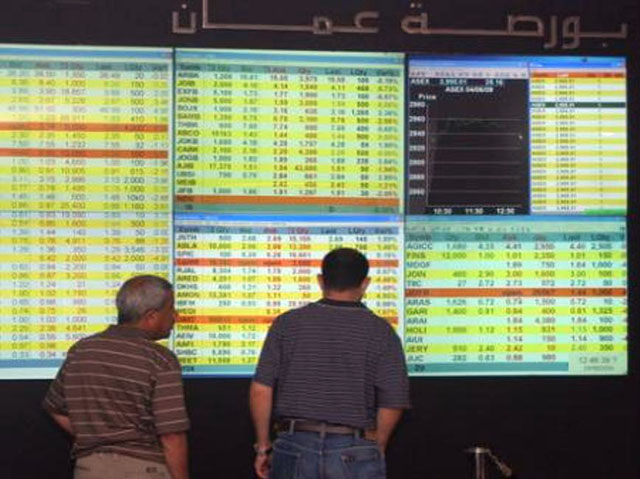AMMAN – Current prices of shares are attractive and represent a good opportunity for investors to enter the stock market, the chief of Amman bourse told The Jordan Times this week.
Nader Azar, chief executive officer of Amman Stock Exchange (ASE), said in an interview that some company shares traded in the market are below their par value.
He also mentioned that dividends proposed to shareholders in a number of corporations are another factor that should attract investors.
Azar said the ASE started 2015 with a positive performance as the free float price index closed by the end of February at 2195.5 points, 1.4 per cent higher than 2014 closing.
He indicated that companies listed on the bourse recorded JD1.2 billion net income before tax for the first three quarters of 2014. The amount is a 7.9 per cent increase compared to the same period of the year 2013.
"I believe this performance will have a positive effect on the stock prices," he said.
Trading in 2014
The trading value last year amounted to JD2.3 billion compared to JD3.1 billion in 2013, a 25.2 per cent fall, while the number of shares traded reached 2.3 billion compared to 2.7 billion shares traded in 2013, a 14.2 per cent drop.
The number of executed transactions declined by 11 per cent to 956,000 from 1.074 million transactions in 2013.
According to the ASE chief, tensions and instability in neighbouring countries continue to weigh on the Jordanian economy, which already faces many challenges such as vulnerability to fluctuations in the oil market prices, increasing pressure on natural resources, especially water; and escalating spillovers from the conflicts.
Due to these challenges, the public debt reached a high level and the budget deficit exceeded its anticipated ratio in the past years.
"These factors affected the ASE performance, especially in 2011," Azar said, describing the effect as unsustainable.
He added that the ASE is working on facilitating trading and attracting new investors to the market in order to increase the trading value and volume, to give the market more depth and to restore investors’ confidence.
Market capitalisation and non-Jordanian investors
Noting that the ASE market capitalisation at the end of 2014 was JD18.1 billion, Azar indicated that non-Jordanian ownership in companies listed on the bourse by the end of last year represented 48.8 per cent of the total market capitalisation, 36 per cent for Arab investors and 12.8 per cent for non-Arabs.
He described this percentage as one of the highest in the region.
At sub-sector levels, non-Jordanian ownership reached 63.7 per cent in mining and extraction industries, 60.5 per cent in technology and communications, and 60.3 per cent in banking.
The market capitalisation of these three sub-sectors represents 72 per cent of the overall market capitalisation of the ASE, he remarked.
"The high level of foreign investors’ ownership in the market capitalisation reflects their confidence in the stock market," Azar said.
"The foreign investors’ ownership has been fluctuating narrowly during the past several years, between 46 per cent and 52 per cent, which proves that they are long-term investments stemming from high-level confidence in the ASE and the investment environment in Jordan," he added.
Azar indicated that the total value of shares bought by non-Jordanian investors in 2014 was JD362.7 million, representing 16 per cent of the overall trading value, while the value of shares sold by them amounted to JD384.8 million.
Trading by individuals
Referring to latest statistics issued by the Securities Depository Centre, Azar said individuals own 31 per cent of the market capitalisation, while the remaining 69 per cent belongs mainly to companies, institutions, funds, and governments.
As for trading activity, individuals account for 75 per cent of the total ASE trading.
Recovery 2015 faster or slower?
Asked whether he expects the bourse to see faster recovery in 2015, Azar mentioned economic growth and regional conditions, noting that some of these factors are beyond control.
However, he said the ASE has many projects in the pipeline to moderate the market and to restore investors’ confidence.
The ASE is part of a joint venture with Muscat, Beirut and Tunisia exchanges; which will implement a new version of the trading system (UTP-Hybrid) developed by NYSE Technologies, he explained, indicating that the ASE plans to demutualise and become a for-profit public shareholding company totally owned by the government as a first step.
This will bring further benefits for both the ASE and the national economy in the future, the bourse chief said, adding that changing the legal status will provide more flexibility and assist the ASE to diversify services and products as well as conclude agreements with regional and international exchanges.
According to Azar, the changes will boost ASE competence, liquidity and capacity to attract new investments.
Azar revealed that capital market institutions are currently working with the Lower House economic committee to discuss modifications and amendments to the current temporarily Securities Law of 2002.
These amendments will pave the way to issuing exchange traded funds (ETFs), demutualisation of the ASE, improving the margin regulations, and improving corporate governance.
The ASE currently is developing a strategic plan for the coming years that will focus on modernising the market up to the international standards, increasing the ASE competitiveness, enhancing the investors’ confidence and raising public awareness.
"I believe that these developments would boost the confidence of local and international investors at the ASE, and will have a positive impact on the ASE’s performance," he concluded.
